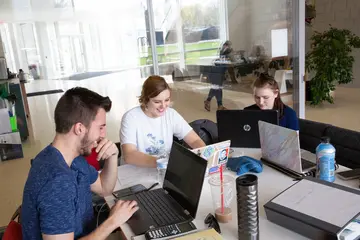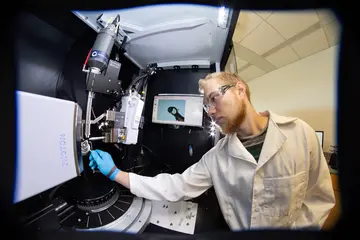Booming STEM Job Growth
The U.S. Bureau of Labor Statistics forecasts a significant increase in STEM-related employment opportunities over the next decade, with an estimated 1.1 million new jobs created in these in-demand fields by 2032.
The world recognizes Fredonia graduates for their ability to innovate no matter the challenge. With immersive hands-on learning and state-of-the-art facilities, Fredonia molds visionary STEM leaders. Our rigorous curriculum combined with personalized guidance from our dedicated faculty equip students to confront challenges with ingenuity. Fredonia's STEM programs produce graduates who are in demand worldwide.
The U.S. Bureau of Labor Statistics forecasts a significant increase in STEM-related employment opportunities over the next decade, with an estimated 1.1 million new jobs created in these in-demand fields by 2032.
According to the latest data, the median annual wages for STEM occupations in the United States reached $98,000 in 2022, significantly outpacing the national average salary across all industries.
Labor market analysis shows that an impressive 93% of STEM occupations in the United States offer wages that exceed the national average, underscoring the exceptional earning potential in these in-demand, technology-driven fields.




STEM students learn to dissect problems, analyze data, and develop logical reasoning skills. This skillset prepares them for a broad spectrum of careers requiring problem-solving and analytical prowess.

The beauty of STEM fields is the endless opportunities they offer for exploration and discovery. From understanding the mysteries of the cosmos to unlocking the secrets of the human body, STEM majors dive deep into subjects that pique their curiosity.

STEM majors architect solutions. The domains of science, technology, engineering, and mathematics are all about devising solutions to real-world problems. STEM majors are at the forefront of making a difference.
With a focus on immersive learning, studying STEM at Fredonia molds students into leaders in the ever-evolving STEM fields.
Students in STEM fields immerse themselves in the core domains of science, technology, engineering, and mathematics. Through theoretical study and hands-on laboratory research, they unravel the mysteries of the natural world. What unifies STEM is an emphasis on logical reasoning, experimental process mastery, technical communications skills, and collaborative problem-solving through lab work, independent research projects, and interdisciplinary challenges. These rigorously technical programs equip the future scientists, engineers, and innovators solving humanity's greatest challenges.
STEM curricula at Fredonia build a robust suite of essential skills and attributes, empowering students to thrive as tomorrow's groundbreaking innovators. Through immersive, hands-on learning, Fredonia STEM students gain expertise in:
Overall, Fredonia's STEM programs instill a powerful blend of intellectual versatility, technical proficiency, and subject matter expertise that allows graduates to tackle complex, multidimensional challenges across scientific and technical domains.
Students who pursue majors in the STEM fields can look forward to outstanding career prospects in today's rapidly evolving job market. As technological innovation continues disrupting industries, the demand for STEM-educated professionals is soaring. This insatiable need for talented researchers, developers, and problem-solvers to spearhead cutting-edge advancements is fueling a hiring surge, with the U.S. Bureau of Labor Statistics projecting a staggering 1.1 million new STEM jobs created by 2032.
The rigor of a STEM education, coupled with the scarcity of supply, makes these graduates highly sought-after. In fact, comprehensive labor market analysis reveals that an impressive 93% of STEM occupations in the United States offer wages that exceed the national average, underscoring the exceptional earning potential in these in-demand, technology-driven fields. The median annual salary for STEM jobs reached $98,000 in 2022, significantly outpacing the national median across all industries.
Science and engineering roles are projected to experience some of the highest growth rates for employment in the next decade. Fields like biomedical engineering, data science, machine learning, renewable energy, robotics, and computer systems analysis are just some examples where qualified STEM graduates are highly coveted. For motivated students eager to participate in shaping our future technological landscape, pursuing a STEM degree provides an empowering pathway to diverse, enriching, and lucrative career opportunities.
My favorite class is ecological hydrology. It's a relatively new field of study, so learning about it at an undergraduate level is incredibly exciting and it has a whole bunch of practical applications to our everyday life.
— Dominik Zimmer
